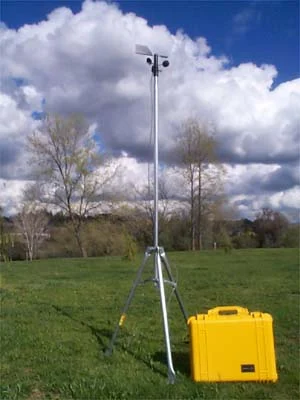Portable Weather Station
₹3.3
We are a leading firm offering Portable Weather Station to our clients. These are easily and fast installed for mobile applications. It is housed in a whether proof case that weighs heavy and can be deployed by one man in five minutes without using tools. Pre wired sensors are installed which just needs power switch to run. Additional memory is also available. Our supervisors ensure the quality while manufacturing the product.
Features:
- Easy and fast installation
- Whether proof
- Pre-wired sensors
Other Details:
- The data logger includes 128KB RAM (approximately 45 days at 15 minutes intervals)
- Additional memory is available
- The system is 12V battery powered with a 7AH battery that will operate for approximately five days between charging
- A 110V battery charger/power supply is included
- An optional solar panel is available
- The data logger will communicate with Windows Hyper Terminal Software for real-time monitoring of data and for data downloading
- NovaLynx also offers several graphical display software programs.
You must be logged in to post a review.
Q & A
Weather stations play a crucial role in modern farming practices by providing valuable data for decision-making and optimizing agricultural processes. When it comes to sustainability, weather stations can contribute in several ways:
Resource Management: Weather stations help farmers optimize resource usage, such as water and energy, by providing accurate and localized weather information. This data enables farmers to make informed decisions regarding irrigation, fertilization, and pesticide application, minimizing waste and reducing environmental impact.
Crop Monitoring: Weather stations provide real-time data on temperature, humidity, wind speed, and precipitation, allowing farmers to monitor and predict crop growth and development. This information helps optimize planting, harvesting, and other critical activities, reducing the risk of crop failure and optimizing yields.
Disease and Pest Management: By monitoring weather conditions, farmers can anticipate and respond to potential disease outbreaks and pest infestations. Weather stations provide early warnings for conditions favorable to specific pests and diseases, enabling farmers to take preventive measures, such as timely application of targeted pesticides or adjusting planting schedules, reducing the need for broad-spectrum chemicals.
Climate Change Adaptation: Weather stations contribute to climate change adaptation strategies by collecting long-term weather data. This data helps farmers understand changing climate patterns and adapt their farming practices accordingly. By monitoring trends, farmers can adjust their crop choices, planting schedules, and irrigation methods to mitigate the effects of climate change.
Energy Efficiency: Modern weather stations are designed to be energy-efficient, utilizing low-power sensors and wireless connectivity options. They often rely on renewable energy sources, such as solar panels, to power their operations, minimizing their carbon footprint.
It's important to note that the sustainability of weather stations in farming depends on their proper installation, maintenance, and integration into farm management systems. Regular calibration, data quality checks, and software updates are essential to ensure accurate and reliable information. Additionally, data privacy and security measures should be implemented to protect sensitive farm information.
Overall, weather stations contribute significantly to sustainable farming practices by optimizing resource usage, improving crop management, and helping farmers adapt to climate change.
General Inquiries
There are no inquiries yet.

















Reviews
There are no reviews yet.